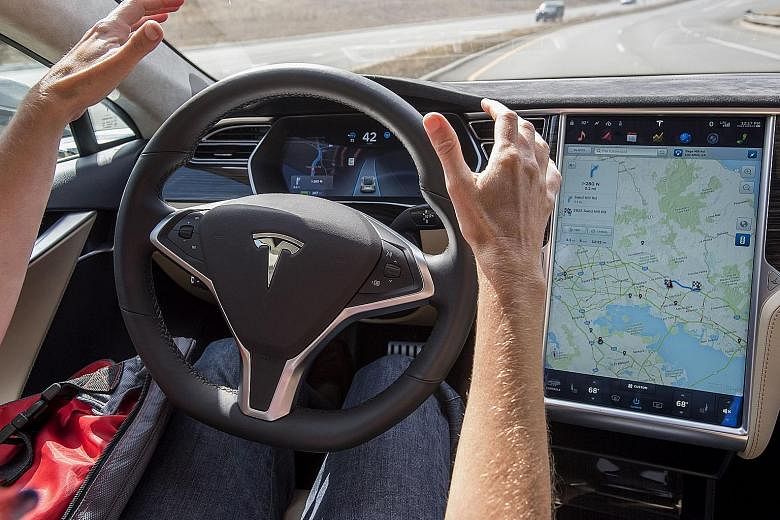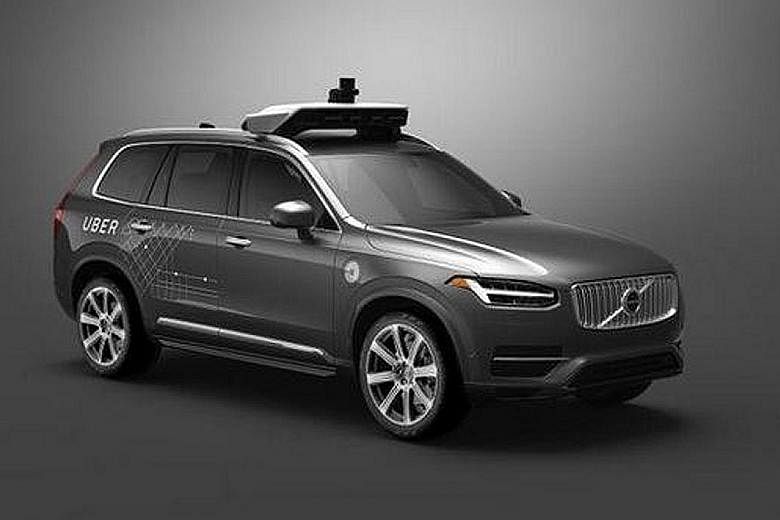PITTSBURGH • A world in which cars drive themselves may come sooner than once thought.
On Thursday, Uber said it would begin testing self-driving cars in Pittsburgh in weeks, allowing people in the city to hail modified versions of Volvo sport utility vehicles (SUV) to get around.
Uber also said it had acquired Otto, a start-up that includes former Google and Carnegie Mellon engineers which is focused on developing self-driving truck technology to upend the shipping industry. Those moves are the most recent indications of Uber's ambitions for autonomous vehicles that can provide services to consumers and businesses.
And they come after Ford Motor's announcement this week that it would put fleets of self-driving taxis on American roads in five years. As part of that effort, Ford said it had acquired an Israeli start-up, Saips, that specialises in computer vision, a crucial technology for self-driving cars. Ford also announced investments in three other companies involved in major technologies for driverless vehicles.
Suddenly, it seems, both Silicon Valley and Detroit are doubling down on their bets for autonomous vehicles. And in what could emerge as a self-driving car "arms race", the players are investing in, or partnering with, or buying outright the companies most focused on the requisite hardware, software and artificial intelligence capabilities.
-
Race to put driverless cars on the road
-
• Tesla chief executive Elon Musk aims to have its driverless technology ready by 2018.
• Uber and Volvo agreed to a US$300 million (S$404 million) alliance to develop driverless cars. The cars will be hitting the streets of Pittsburgh this month.
• Google wants to release fully autonomous cars. Its test cars have driven over 2.9 million km in autonomous mode as of last month.
• Toyota is looking to have a driverless car ready to go by 2020. To help make that goal a reality, it invested US$1 billion in artificial intelligence and robotics last November.
• BMW will introduce its self-driving cars in China in 2021.
• Volvo is aiming to make its cars "death-proof" by 2020 by rolling out semi-autonomous features in its cars, eventually working up to fully driverless ones.
• Nissan is committed to having a commercially viable autonomous car on the roads by 2020.
• Ford is aiming to have its fully autonomous car ready in four to five years. Ford will roll out a fleet of self-driving cars as part of a ride-sharing or -hailing service by 2021.
• General Motors has partnered with Lyft to build electric, fully driverless cars that will be available to just about anyone.
• Daimler, the maker of the Mercedes-Benz, is aiming to have its driverless trucks ready by 2020.
• Audi has already developed a car that can drive by itself. The Audi A7 drove 885km by itself last year.
• Baidu, a Beijing-based search company, is aiming to have a commercial model of its driverless car ready by 2018.
• Honda is aiming to have fully autonomous cars on the road in 2020.
• Hyundai is aiming to have driverless features in its cars by 2020, but will not have a fully autonomous car ready until 2030.
• Apple is rumoured to be working on a driverless car, but it has yet to confirm this.
• Car supplier Bosch has been working on driverless technology for several years, with the ultimate goal of having an autonomous car ready in 2020.
• PSA Groupe, the second-largest car manufacturer in Europe, is aiming to have fully driverless cars ready by 2020.
• Start-up Faraday Future is working on an electric car and is developing autonomous technology. Its cars are slated to go into production by 2020.
• LeEco, a Chinese tech company, is also working on an autonomous, electric car.
Source: Business Insider
"It appears 2016 will go down in history as the year of the autonomous vehicle partnership," said Mr Karl Brauer, an analyst with the car research firm Kelley Blue Book.
When Uber puts its modified Volvo SUVs on the streets of Pittsburgh, it will be the first, fledgling attempt to commercialise vehicles that drive themselves without the need for a human at the controls.
Mr Brauer said the partnership between Volvo and Uber, which plans to invest US$300 million (S$404 million) in their self-driving car effort, was part of a growing trend of big carmakers joining forces with technology firms. It comes after a US$500 million investment in January by General Motors (GM) in Uber's ride-hailing competitor Lyft, and an agreement in May by Fiat Chrysler to work with Google to create-self-driving minivans.
But the Ford and Uber initiatives are not without risk. Federal car safety regulators are preparing guidelines for autonomous vehicles that may or may not include the need for a steering wheel or require a driver who can step in should computerised systems falter.
In addition, the self-driving revolution has already hit a few speed bumps. Electric carmaker Tesla is under investigation by federal regulators looking into a fatal crash in May of a Tesla Model S sedan whose driver had the vehicle's Autopilot assisted-driving system engaged.
German carmaker Daimler was recently forced to pull an advertisement in the United States that possibly overstated the safety of assisted-driving options of a new Mercedes-Benz. And Google is continuously explaining how minor accidents are occurring in self-driving vehicles it has been testing for some time in California.
In a nod to the highly experimental nature of its Pittsburgh plan, Uber intends to have an actual human behind the wheel - just in case. But while Ford is looking five years out, Uber is moving aggressively towards driverless fleets despite the regulatory uncertainties.
"There's an urgency to our mission about being part of the future," Mr Travis Kalanick, Uber's chief executive, said on Thursday. "This is not a side project. This is existential for us."
Like Uber, Google is intent on developing self-driving cars for urban taxi use, reasoning that the slow speeds and relatively predictable environment of city streets that can be thoroughly, digitally mapped is the best and safest near-term purpose of autonomous vehicles. But for Uber, such cars are a way to be more fully in control of its business by eliminating the need for drivers who expect to be paid.
"Uber arguably has more at stake in creating self-driving cars than any other automotive entity," Mr Brauer said.
NEW YORK TIMES


